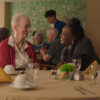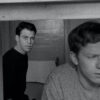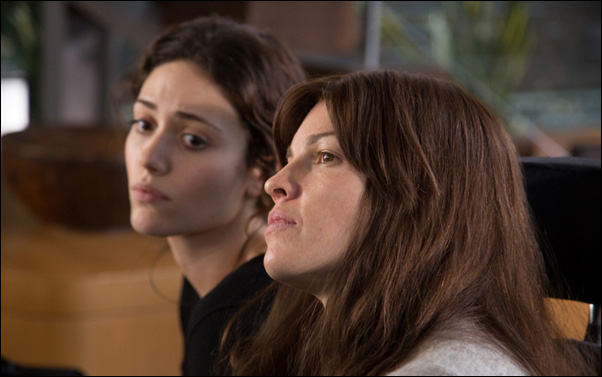After helming some of the most daring productions the stage has ever seen with the likes of “Angels in America,” “Take Me Out” and “Bring in ‘Da Noise, Bring in ‘Da Funk” under his belt, audiences have come to expect the unexpected from George C. Wolfe, which is why it may only make sense that his film career has been just as surprising, even to the director himself.
“I don’t think I’ll be doing another love story for a while,” Wolfe says, aware that after bringing Ruben Santiago-Hudson’s “Lackawanna Blues” to the screen as his feature debut in 2005, few would have predicted his follow-ups to be an adaptation of Nicholas Sparks’ “Nights in Rodanthe” and his latest, the similarly tearjerking “You’re Not You.” However, his unpredictability has made him uniquely qualified for the challenge of breathing life into Michelle Wildgen’s novel onscreen, a drama that easily could’ve been an unabashed weepie of the highest order as it tells the story of Kate, a well-to-do former concert pianist (Hilary Swank) who comes to rely on Bec, an aimless college student (Emmy Rossum), as her caretaker after she contracts the debilitating neurodegerative disease ALS (better known as Lou Gehrig’s Disease), but instead comes off as a touching warts-and-all look at the evolution of a friendship under the most unfortunate of circumstances.
Accustomed to crafting details for a medium where an audience’s eyes can wander anywhere, Wolfe’s attention to every aspect of the film is palpable. He gently captures the two separate, distinct worlds Kate and Bec have created for themselves and finds the sparks as they begin to merge into one, knowing that the sheer power of watching Swank, an actress known for her toughness, robbed of her agency is enough to tug at the heartstrings and Rossum, tapping into the same unbridled candor she’s exhibited as the unflappable Fiona Gallagher on “Shameless,” providing more than enough personality for them both. Shortly before “You’re Not You” hits theaters, Wolfe spoke about creating these “invisible worlds,” how the characters’ bond over music became ingrained in the fabric of the film and what he might be doing next.

It’s interesting. Very early in my career, back when I was primarily a writer for the theater, I did this play called “The Colored Museum” and I got all these offers to write screenplays but something about it didn’t feel right. Then I was tied up doing other things and I ended up doing “Lackawanna Blues” for HBO and I had fun. I didn’t expect to have fun. Then there had been other projects I’ve been involved with — one big movie project that ended up making ridiculous amounts of money I had to turn down because it happened on top of a play that I had made a prior commitment to – so it’s an interesting juggling dynamic. This project [“You’re Not You”], I got called about while I was working on a bunch of other stuff and I think I went out there in August for a meeting and I was in pre-production in October, so it fit perfectly into [everything else]. I was getting ready to go do “Lucky Guy,” Nora [Ephron]’s play, right afterwards, so it was the perfect time to do something.
So besides timing, what attracted you to this?
I think the incredible story about an intimate, non-sexual relationship between two women based on their friendship and their connection and their caring for each other. I was intrigued by the idea that these two women were able to evolve when they didn’t have any other relationship in their lives. That was really fascinating and Hilary [Swank] was already attached, so I was excited by that. I said, “If we find these two perfect women, it would be a thrilling, fascinating journey and a world I’d never been inside of.” In the theater, a lot of my work tends to be, for lack of a better word, tougher and dealing with politics in the world, so I was just to explore this very intense, very adult relationship and also to work with a wonderful cast, which I ended up doing.

I don’t think I’ll be doing another woman in peril movie for a long time. [laughs] It was fun to do. It was great. It popped up and there it was, so I did it, but there’s other projects. I have a project that I’ve been working on about Serbia and another project that I’m working about Detroit, so it’s whatever comes through. The thing which is interesting for good, bad, right, or wrong, is that I like doing many different kinds of things. My first Broadway show was a musical, “Jelly’s Last Jam,” then that was followed by “Angels in America” and after that I did a one-woman show [Anna Deveare-Smith’s “Twilight: Los Angeles, 1992”]. Then I did Shakespeare, a production of “The Tempest,” with Patrick Stewart, and after that, this very edgy musical “Bring in ‘da Noise, Bring in ‘da Funk.” So I try to explore as many different weapons and muscles as I possibly can, which is why “Nights in Rodanthe” was the first love story thing, I went, “Oh, okay, that’s interesting.” [“You’re Not You”] is a love story, too, but it’s a very different thing.
I really admired how easily this film could’ve played as a silent movie since you so distinctly place these two women in different places both physically and emotionally. Was that a challenge?
One of the things which was interesting was finding the house that the Hilary character [Kate] lived in. We searched and we searched, then we found this place, which is sort of perfect and inhuman. The house had a sense of performance to it. It didn’t have an equation of intimacy at all, so finding that house liberated my visual brain because then I understood how I could tell this story inside of this world and try to play around with how this house transforms as these people transform. That was fun as well as finding the location where they go shopping with all the fruits and vegetables in downtown LA [which is presented as Houston in the film]. It’s one of my favorite locations I’ve ever found because it was so chaotic and real and organic, the exact opposite of the world that [Kate] lived in at the beginning of the film. It’s always fun to try to find these invisible worlds — You see them but they aren’t [at the fore with] dialogue attached, but if you follow them, they’re telling you a parallel story. The story is, in many respects, going from a precision that is not human to a frailty that is very human and [there’s] visual and sonic components that affirm that as well.

It was very much so. All the piano score stuff was done by Jeanine and there’s so much emotion in it. [Her Off-Broadway production of] “Fun Home” was my favorite show from last year, and [the point of the score was to find] these different voicings – Bec’s voice and Kate’s voice. I was also really intrigued by the [Kate] character, who is in essence has given up her art at the beginning of the film because she was a concert pianist. When you stop being creative, it doesn’t go away. It just moves. In her case, it manifests itself in trying to achieve a perfection and then the brutality of this disease sort of shatters what illusion she has been hiding behind and the truth cannot but not come out. I was intrigued by the tension of that dynamic as well.
When you have a shooting schedule that likely won’t allow you to make the film in chronological order, is it a different thing to modulate a performance, particularly when a character like Hilary Swank’s Kate has deteriorating health?
That was fascinating. Hilary and Emmy are both, in addition to being emotionally brilliant actors, astonishingly skilled, so in [between] the various takes where I’d give them notes, it would be very thrilling because I’d go up and give them [something] very specific, just to see how they would, [with] their skill set and their depth, incorporate that note instantaneously. You would see it and it would be very subtle, but it would be unquestionably there. Hilary was very diligent and then we also had this woman who works with a lot of ALS patients, a caregiver who was on helping police this journey, particularly when we did shoot out of sequence. That was just another fun thing to keep up with — what would we hear in terms of a speech pattern and the physical disability of what the limbs were doing — as we were figuring out how that was all incorporated into the emotional transformation of this woman. As Kate loses a certain kind of physical command, she’s gaining an emotional clarity and that dichotomy was really fun and thrilling to play with.

It’s very interesting. A lot of times, particularly in the work that I’ve done with musicals, I’ve used a lot of filming techniques – there are dissolves and quick cuts that you can do on stage. In this project, what was interesting as we get down to the last couple of scenes is that there is no other world than their faces because that’s all they’re seeing and all we’re seeing. It was fun to start with Kate almost being a piece of sculpture in her sculptured world until she’s nothing but feeling and eyes and vulnerability. It was one of the things that I found so fascinating and brutal about the disease [ALS] — it does not affect the mind in any way, shape, or form. The mind is perpetually alert while the body is being betrayed by this disease. A lot of times with diseases when one thing goes, everything goes.
But I remember when we started working, we ended up going to this benefit for ALS and there was a woman on stage in a wheelchair and she wasn’t able to move anything. She had just gotten the disease seven months earlier and I found it very powerful and very moving. Then at one point when we were filming one of the scenes in a hospital, this young kid came to the set, who one of the producers knew, and he was 24, and he was just going, “Oh my god” [to see the toll of the disease]. The brutality of the disease informed the work and this incredible sense of responsibility that everybody brought to it.

I don’t know what the status is of “Anna in the Tropics.” Right now, I’m currently not connected with it. But it’s all about the story and you have to figure out what you need to use to tell the story. To me, that’s the bigger variable more than switching from stage to film. One of the projects that I might be doing next is set in the world of politics and it’s a very muscular world and it’s very much a boy world because it’s a period piece, so I’m just fascinated by what that’s going to bring out in me as a director, just like working on this story, what did it bring out in me to work on this? I used to always say to myself if I can locate the intimacy and the urgency in the story, then I know I can do it. That’s my guiding principle. Another thing I’m working on is based on a very popular book, but you have to liberate yourself from all of that and go, “I have a story that I know how to tell.” Hopefully, it will be good, smart, and compelling.
“You’re Not You” opens on October 10 in Los Angeles at the Sundance Sunset 5 and in New York at the Quad Cinema.




Comments 1